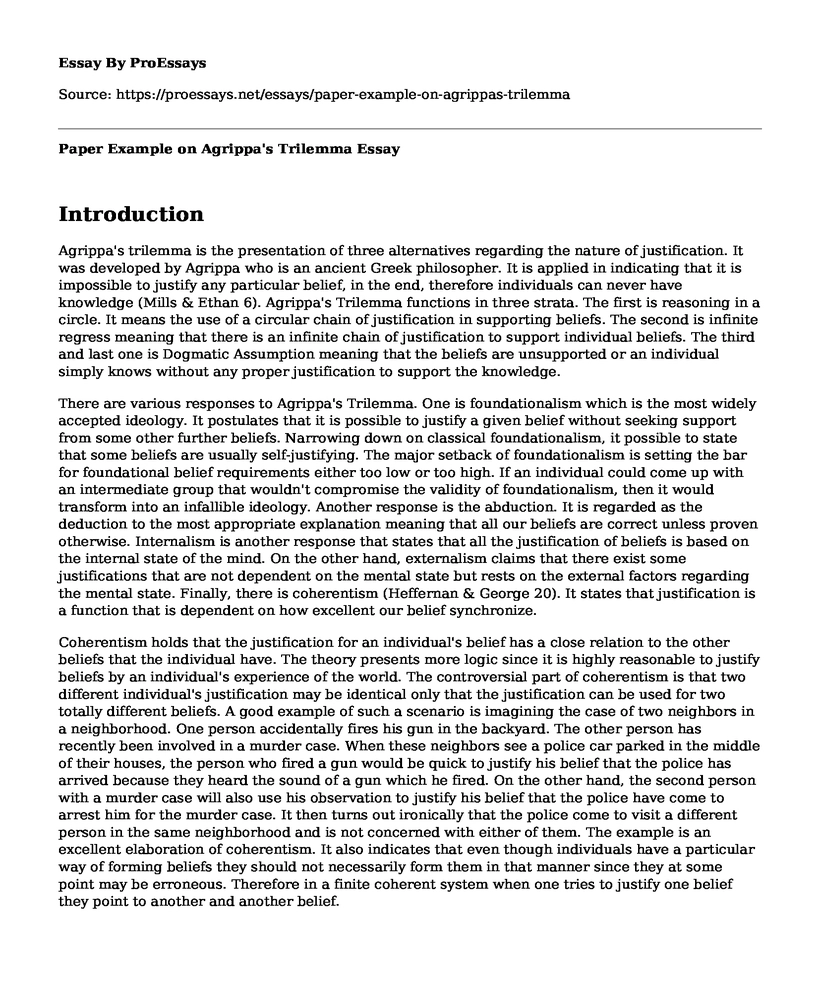Introduction
Agrippa's trilemma is the presentation of three alternatives regarding the nature of justification. It was developed by Agrippa who is an ancient Greek philosopher. It is applied in indicating that it is impossible to justify any particular belief, in the end, therefore individuals can never have knowledge (Mills & Ethan 6). Agrippa's Trilemma functions in three strata. The first is reasoning in a circle. It means the use of a circular chain of justification in supporting beliefs. The second is infinite regress meaning that there is an infinite chain of justification to support individual beliefs. The third and last one is Dogmatic Assumption meaning that the beliefs are unsupported or an individual simply knows without any proper justification to support the knowledge.
There are various responses to Agrippa's Trilemma. One is foundationalism which is the most widely accepted ideology. It postulates that it is possible to justify a given belief without seeking support from some other further beliefs. Narrowing down on classical foundationalism, it possible to state that some beliefs are usually self-justifying. The major setback of foundationalism is setting the bar for foundational belief requirements either too low or too high. If an individual could come up with an intermediate group that wouldn't compromise the validity of foundationalism, then it would transform into an infallible ideology. Another response is the abduction. It is regarded as the deduction to the most appropriate explanation meaning that all our beliefs are correct unless proven otherwise. Internalism is another response that states that all the justification of beliefs is based on the internal state of the mind. On the other hand, externalism claims that there exist some justifications that are not dependent on the mental state but rests on the external factors regarding the mental state. Finally, there is coherentism (Heffernan & George 20). It states that justification is a function that is dependent on how excellent our belief synchronize.
Coherentism holds that the justification for an individual's belief has a close relation to the other beliefs that the individual have. The theory presents more logic since it is highly reasonable to justify beliefs by an individual's experience of the world. The controversial part of coherentism is that two different individual's justification may be identical only that the justification can be used for two totally different beliefs. A good example of such a scenario is imagining the case of two neighbors in a neighborhood. One person accidentally fires his gun in the backyard. The other person has recently been involved in a murder case. When these neighbors see a police car parked in the middle of their houses, the person who fired a gun would be quick to justify his belief that the police has arrived because they heard the sound of a gun which he fired. On the other hand, the second person with a murder case will also use his observation to justify his belief that the police have come to arrest him for the murder case. It then turns out ironically that the police come to visit a different person in the same neighborhood and is not concerned with either of them. The example is an excellent elaboration of coherentism. It also indicates that even though individuals have a particular way of forming beliefs they should not necessarily form them in that manner since they at some point may be erroneous. Therefore in a finite coherent system when one tries to justify one belief they point to another and another belief.
Reference
Heffernan, George. "Phenomenology of Evidence: Promises, Problems, and Prospects." Dialogue and Universalism 3 (2015): 9-24.
Mills, Ethan A. "Nagarjuna's Pancakoti, Agrippa's Trilemma, and the Uses of Skepticism." Comparative Philosophy 7.2 (2016): 6.
Cite this page
Paper Example on Agrippa's Trilemma. (2022, May 30). Retrieved from https://proessays.net/essays/paper-example-on-agrippas-trilemma
If you are the original author of this essay and no longer wish to have it published on the ProEssays website, please click below to request its removal:
- The Matrix Between Descartes and Plato Questions and Answers
- Theories of Personality Essay Example
- Land Ethics Essay Example
- Article Analysis Essay on Wasting Time on the Internet and Is Google Making Us Stupid
- Human Nature: Unchangeable but Not Unmalleable - Essay Sample
- Essay Example on God's Purpose for Us: From Creation to Christ
- Epistemology: S-Knows-That-P Terrible Consequences - Essay Sample







